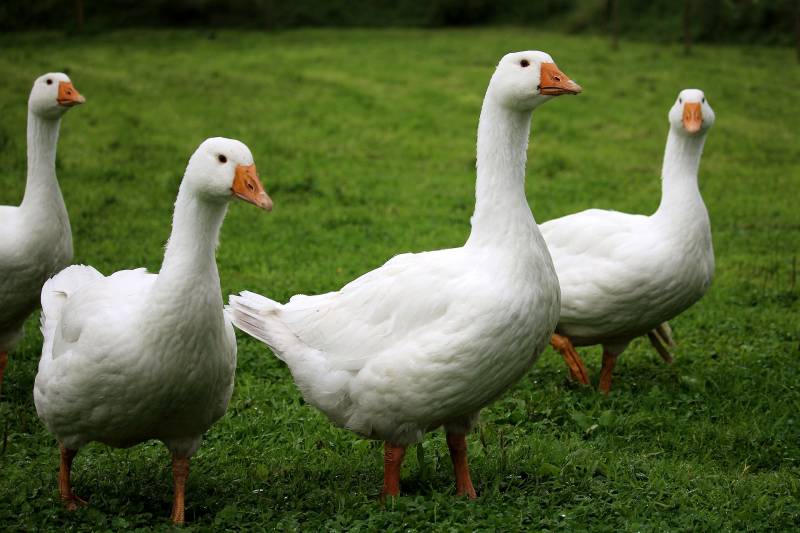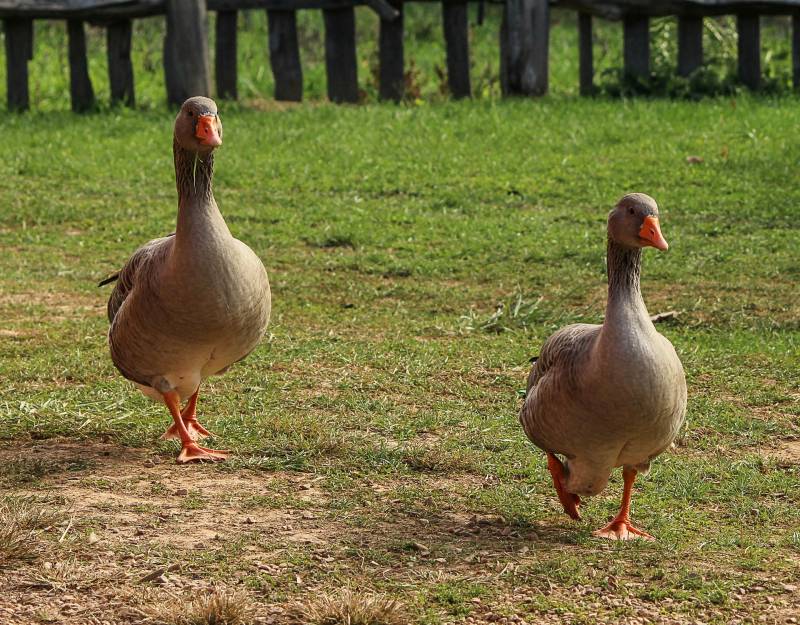Quick Navigation
Most people keep geese for their eggs, meat, and feathers. Besides, geese can also be reared because of their ornamental value.
Unlike chickens, geese are straightforward to keep, resistant to diseases, and grow faster.
Female geese are referred to as geese, while male geese are known as a gander.

Even though geese are easy to bring up, these birds are also stubborn and very aggressive.
Many people (owners and passers-by) have had awful experiences with geese. But what does it mean if a goose hisses at you?
This is a common question in geese forums, and that’s why we decided to elaborate so that people can know why geese hiss.
1. To Protect Their Young Ones And Territory
Geese usually hiss when they are trying to protect their young ones, eggs, or territory.
They are also very aggressive when they are mating or hatching.
So, if you come close to their home or goslings, they will hiss and even attack you.
Geese are very territorial, and that’s why they have been used as guard animals for centuries.
The geese are good at protecting your home or their territory as they can honk loudly and create an alarm.
Geese are instinctively protective and more naturally befit to guard work than dogs and humans.
Thanks to their ultraviolent light feature, they have better vision than that humans.
They can sense movement even before humans do. Besides, most birds don’t react to what they see, but geese do.
That’s why you will see them hiss, sound off, or become aggressive when they see humans or even other animals close to their home or territory.
See also: Why Canadian Geese Are Protected
Another reason why geese hiss is that they don’t like to share. So, if the geese feel that you are overstepping into their territory, they will hiss as a sign to ward you off.
This also explains why geese are monogamous.
Unlike the chicken, geese find a partner in their second year and they stick together for the rest of their lives.
As a result, they become adjusted to one another and become exceptional at coordinating tasks.
When a goose is laying eggs, the dander will provide security and protect it from any predator.
So, geese will hiss to chase you away from their territory, food, and family.
It will go to the extent of even attacking you if you don’t back off.
3. Way Of Communicating With Other Geese
A goose can also hiss to communicate with other geese. It does this when it’s trying to tell other geese to back off.
This usually happens when they are feeding, and the geese are trying to protect their food from other geese.
However, geese usually honk to communicate with one another.
Therefore, if it hisses at another goose, it shows that it’s business time and doesn’t want any nonsense near its food or goslings.
For short communications, geese typically use quiet, short grunts to talk to one another.
This usually takes place when the goose is communicating with young ones or during mating.
But when you hear geese honk while flying, this is a way of encouraging their leaders to keep flying.
4. They Need Your Attention
Sometimes, a goose will hiss because it needs your attention. Maybe you’re not feeding it, or you’re trespassing on its territory.
This is very normal if you usually feed the geese.
If you’re feeding many geese and one of them is hissing, it may be a sign that it’s not getting food, and you should throw it some.

Note that geese are very intelligent animals and will memorize your face and gestures.
Therefore, if you normally feed them and get close to them, they may think you want to feed them.
As a result, they may hiss to get your attention or as a way of asking for their treat.
5. They Are Warning You
Last but not least, you should never ignore a hissing goose.
Additionally, you should never give it your back as you may end up regretting it.
If a goose is walking by with its goslings and you hear it hissing, stay clear of the family.
This is a warning sign before they attack you.
Geese are not afraid and can attack any animal or person they perceive to be a predator.
So, if you hear a goose hiss, even if it’s not in its territory, you should give it some distance or risk being attacked.
How Can You Avoid A Geese Attack?
Now that you know why geese hiss, it’s also essential to avoid their attack so that you don’t become a victim.
Here are some things that you should know about to avoid a geese attack:
- Look out for warning signs – apart from hissing, you should also stay away from the geese if it bobs its head and honks. These are signs that the geese want to charge.
- Never turn your back – when the geese start to pursue you, ensure to face it and don’t close your eyes or turn your back.
- Avoid feeding the geese – if you feed the geese constantly, they won’t be afraid of you anymore. Additionally, they will become aggressive if you don’t give them food when they want it.
- Remain calm and don’t yell – never show any sign of fear when near geese. This is because they may cause this with aggression and attack you. So, always remain calm and don’t yell at them.
Final Thoughts
Now that you know why a goose hisses, you should always take caution when handling or walking close to a geese family.
Geese hiss as a way of fending you off as they protect their family.
Also, they can hiss to warn you, communicate with other geese, get your attention, or chase you away from their territory.
Regardless of the reason behind the geese hissing, you have to walk a distance from them as they can charge anytime.
Geese are not afraid of humans or other animals.
They are very aggressive and can end up attacking you if you don’t back off.
So, always watch your geese closely and take the right action to avoid being a victim of these aggressive birds.

Zoey is a long-time pet owner and animal rights advocate, a vital part of Purrfect n’ Pawesome. She shares her unique experiences and learnings with her readers to enhance their understanding of pet behavior and nutrition. Along with being an active pet writer, she volunteers at multiple animal shelters, rescue centres with some bespokenly awesome pets.
Zoey has a lot to share when raising the pets and spending life being their true friends. She has a quite pampered Persian cat and a Ragdoll, whom she loves the most. Readout her blogs to know more about being a responsible parent to your beloved pets.
“I love to be around cats and dogs; that’s my passion and my trick to get away from all the negativity and soaking in unconditional love and affection. Being attached to this platform gives me the reason to be vocal about pet love, care, and nurturing. Although I am not an expert or veterinarian by any means, I have a lot of experience and learnings to share with my fellow readers.”
